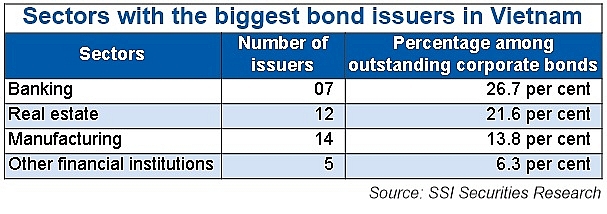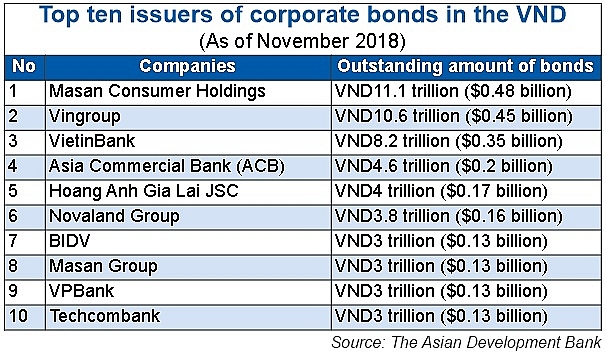New regulations set to aid growth in bond market
 |
 |
After years of lagging behind the equity market, the country’s corporate bonds are finally expected to flourish in 2019. On February 1, Decree No.163/2018/ND-CP will take effect, paving the way for Vietnamese firms to finance their businesses with bonds. According to Decree 163, in order to be able issue bonds, a company is no longer required to be profitable in year before the proposed issuance. Instead, the company only needs to operate for at least one year and its financial statement is audited by a qualified auditor. This allows loss-making businesses to receive assistance from outside investors in order to revive their financial health. The same rule applies to businesses that sell bonds in overseas markets. Previously, those wanting to move debts abroad had to prove their profitability over a three-year period.
Decree 163 also specified the difference between a private bond placement and a public one, as the structure will determine how much information is made available to the public. Moreover, the new bill requires all issuers register their bonds within 10 days following the transaction.
Despite relaxed criteria regarding profitability, Decree 163 is far stricter with information disclosure than former regulations. Specifically, the issuer must provide up-to-date details of its bond issuance prior to, during, and after the sale. Following this, the issuer must release updates on disbursement, related financial figures, and the repayment progress. Bond investors should be notified within 24 hours of any significant changes at the business.
Finally, the Vietnam Stock Exchange is also responsible for releasing biannual and annual updates on the country’s corporate bond market.
Phan Thi Thu Hien, head of the Banking and Corporate Finance Department at the Ministry of Finance, said these requirements will create a transparent bond market domestically, giving investors access to information they need to make decisions.
“We’re also looking to build a central credit agency for corporate bond issuers, as well as calling for more investors into the market,” said Hien.
The list of potential buyers includes Vietnam’s Social Insurance Fund, commercial insurers, future pension funds, and individual investors, in particular bank depositors. Bank deposits currently take up 85 per cent of the country’s GDP, and corporate bonds can offer higher returns for depositors. Seeking new investors is also crucial for the nation’s corporate bond market. At present, the vast majority of bond buyers are commercial banks who regard corporate bonds as another form of credit.
Moreover, Decree No.16/2018/TT-NHNN stated that commercial banks in Vietnam should only use 40 per cent of short-term funds for mid to long-term loans. The ratio was previously 60 per cent before 2017. This means banks will have less money available for corporate bonds over the coming years, forcing the domestic bond market to diversify its list of buyers.
“With the rapid expansion of the Vietnamese economy, we expect more quality corporates to tap into the capital markets for fund raising activities in diversifying their sources of financing. Recent successful transactions can encourage more corporate issuers to consider the bond market as a viable financing option,” said Nirukt Sapru, CEO Vietnam, ASEAN and South Asia Cluster Markets at Standard Chartered Bank. In 2018, the bank assisted a number of Vietnamese listed companies, such as Nam Long Group, Mobile World Corporation, and PAN Group, with their bond sales.
PAN Group CEO Nguyen Thi Tra My regards the group’s $49.3-million bond issuance last year as a “significant milestone”. “The five-year bonds, whose annual interest rate is fixed at 6.8 per cent, are testament to investors’ trust in the long-term future of PAN and Vietnam’s corporate bond market,” My said.
What the stars mean:
★ Poor ★ ★ Promising ★★★ Good ★★★★ Very good ★★★★★ Exceptional
Related Contents
Latest News
More News
- 0.1 per cent tax proposed on each transfer of digital assets (February 05, 2026 | 17:27)
- Ministry of Finance tightens policy delivery at start of year (February 05, 2026 | 17:26)
- Vietnam steps up market reforms as FTSE Russell reviews upgrade progress (February 05, 2026 | 17:20)
- 2025 profits mixed amid strong energy and farming results (February 05, 2026 | 17:18)
- Cashless payments hit 28 times GDP in 2025 (February 04, 2026 | 18:09)
- SSIAM and DBJ launch Japan Vietnam Capital Fund (February 04, 2026 | 15:57)
- Banks target stronger profits, credit growth in 2026 (February 04, 2026 | 15:43)
- Vietnam on path to investment-grade rating (February 03, 2026 | 13:07)
- Consumer finance sector posts sharp profit growth (February 03, 2026 | 13:05)
- Insurance market building the next chapter of protection (February 02, 2026 | 11:16)

 Tag:
Tag:




















 Mobile Version
Mobile Version